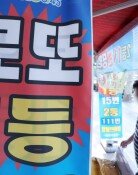Labor Peace
Huh Joon-young, CEO of the state-run Korea Railroad Corp., or Korail, and the companys union leader Kim Ki-tae signed an agreement Monday on a wage freeze for the second consecutive year and slashing the number of full-time union officials from 64 to 14. This is the first time for the union to end annual wage negotiations without going on strike or work slowdown. Kim said the union made its decision considering the governments anti-union stance and reality. Observers say the union concluded that had it continued with its hard-line struggle, it would have lost support of the public, not to mention that of members.
This year has seen 74 strikes through Monday, down 33 percent from the same period last year. The number of lost work days decreased 19 percent from 540,000 days to 440,000. Though the number is still five times higher than those of major advanced economies, the downward trend is clear. Earlier this month, labor disputes that had lasted years over temporary workers laid off by Kiryung Electronics and Donghee Auto were finally resolved. This perhaps signals a soft landing for Koreas militant labor movement, which exploded after the democratization campaign was started in 1987.
More unions are taking disputes to the National Labor Relations Commission rather than going on strike. In the first nine months of this year, 10,499 complaints on unfair labor practices were filed with the commission, up 12 percent from a year earlier. An increasing number of unions are opting for win-win situations instead of hard-line struggle. A combined 2,804 labor peace declarations were made this year through early November, up 29 percent from the same period last year. Such declarations made by workplaces under the militant Korea Confederation of Trade Unions increased from 19 to 48 over the period.
Lee Dong-eung, an executive at the Korea Employers Federation, attributed the decrease in labor strife to the publics negative perception of unions` hard-line stance, not to mention the illegal and violent actions of unions. He also said workers attach greater importance to job security because of the economic slump and that the incumbent administrations emphasis on law and principles in labor issues prevent unions from going on excessive strikes. Under such an atmosphere, unionized metal workers under the confederation and power generation workers canceled a planned strike over the Group of 20 summit period in Seoul last week.
Editorial Writer Hong Kwon-hee (konihong@donga.com)
Headline News
- Joint investigation headquarters asks Yoon to appear at the investigation office
- KDIC colonel: Cable ties and hoods to control NEC staff were prepared
- Results of real estate development diverged by accessibility to Gangnam
- New budget proposal reflecting Trump’s demand rejected
- Son Heung-min scores winning corner kick







